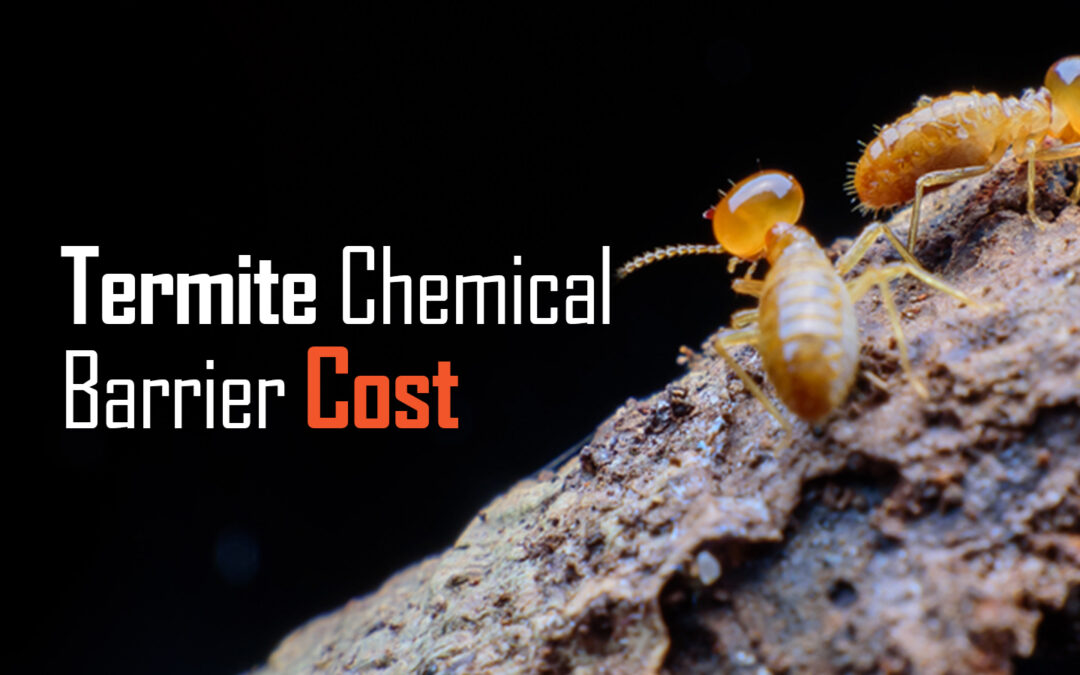Termites, known as “silent destroyers,” can cause significant property damage, creating financial stress for homeowners. Therefore, effective termite protection is essential. Termite chemical barriers offer a strong defense, forming an impenetrable shield against these pests. In this guide, we explore termite chemical barrier cost, covering benefits, types of chemicals, cost factors, the importance of professional installation, DIY options, and overall cost implications. This knowledge helps homeowners understand and manage the costs and benefits of termite protection.
Understanding Termite Chemical Barriers
Termite chemical barriers are renowned in the realm of termite management, embodying a proactive approach to protecting properties from the ravages of termite infestations. Think of them as protective shields around your home. These barriers are made by spreading special chemicals around the edges of your house. These chemicals act like a force field, keeping termites away. They’re like a big “no entry” sign for termites, stopping them before they can damage your home.
Termite inspection chemical barriers are effective because they target termites where they’re most likely to enter your home. By creating this continuously treated soil zone, we’re essentially telling termites, “Sorry, not welcome here!” This keeps your home safe from termite attacks, saving you from the headaches and expenses of fixing termite damage.
Get A Free Quote
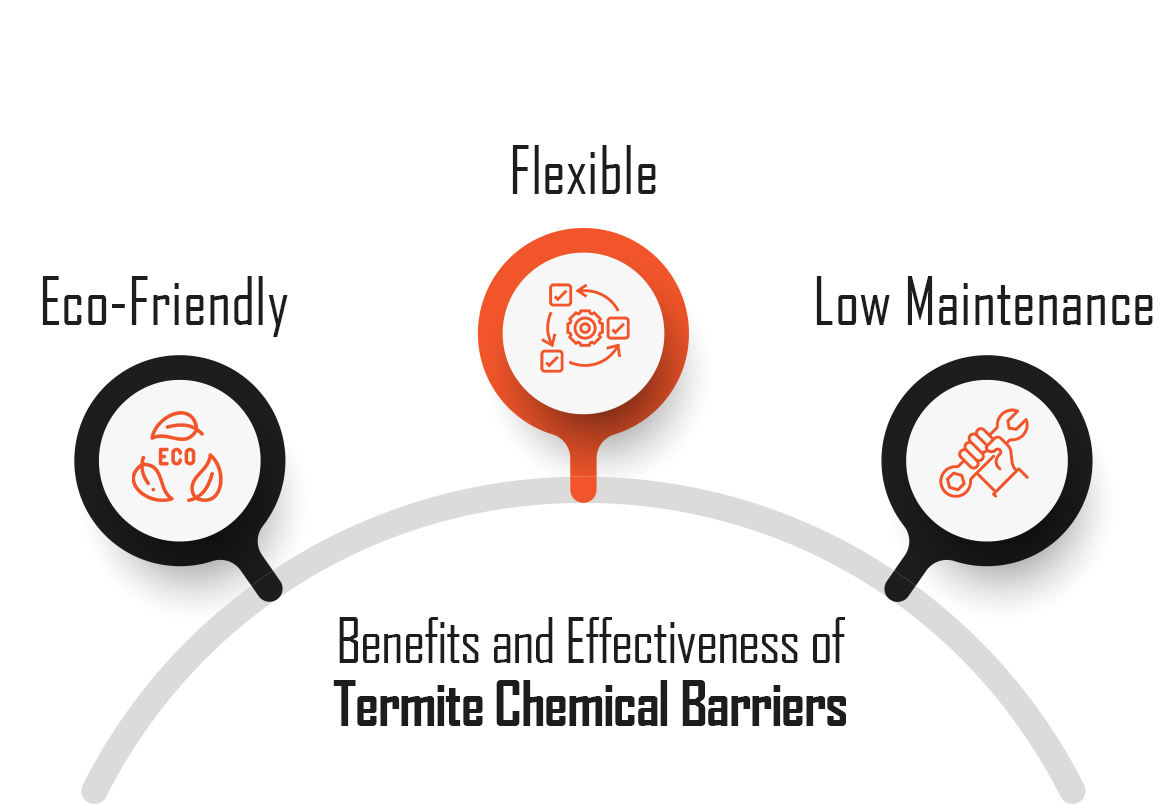
Benefits and Effectiveness of Termite Chemical Barriers
The benefits of termite chemical barriers extend beyond mere pest control; they represent a proactive investment in property preservation. They’re like a shield that protects your home even before termites show up. This means you don’t have to wait until termites start eating your home to do something about it.
Plus, these barriers keep working for a long time, so you can relax knowing your home is safe. Even though setting up termite chemical barrier cost money at first, the benefits you get from them are much more valuable. That’s why it’s a smart choice for homeowners who want to protect their homes wisely. And the best part? These barriers are designed to be safe for people, pets, and the environment.
In addition to their preventive capabilities, termite chemical barriers provide several other notable advantages. These include:
Eco-Friendly: Many of the chemicals used in these barriers are safe for the environment, so you can protect your home without harming nature.
- Flexible: Whether you have a small house or a big building, termite barriers can be customized to fit your needs. They’re like custom-made shields for your property.
- Low Maintenance: Once the barriers are set up, they don’t need much attention. They quietly do their job without bothering you, giving you peace of mind.
Read More:
Termite Inspections Costs
How to Get Rid of Bull Ants
Termite Reticulation Refill Cost
What is a Termite Barrier For a Concrete Slab?
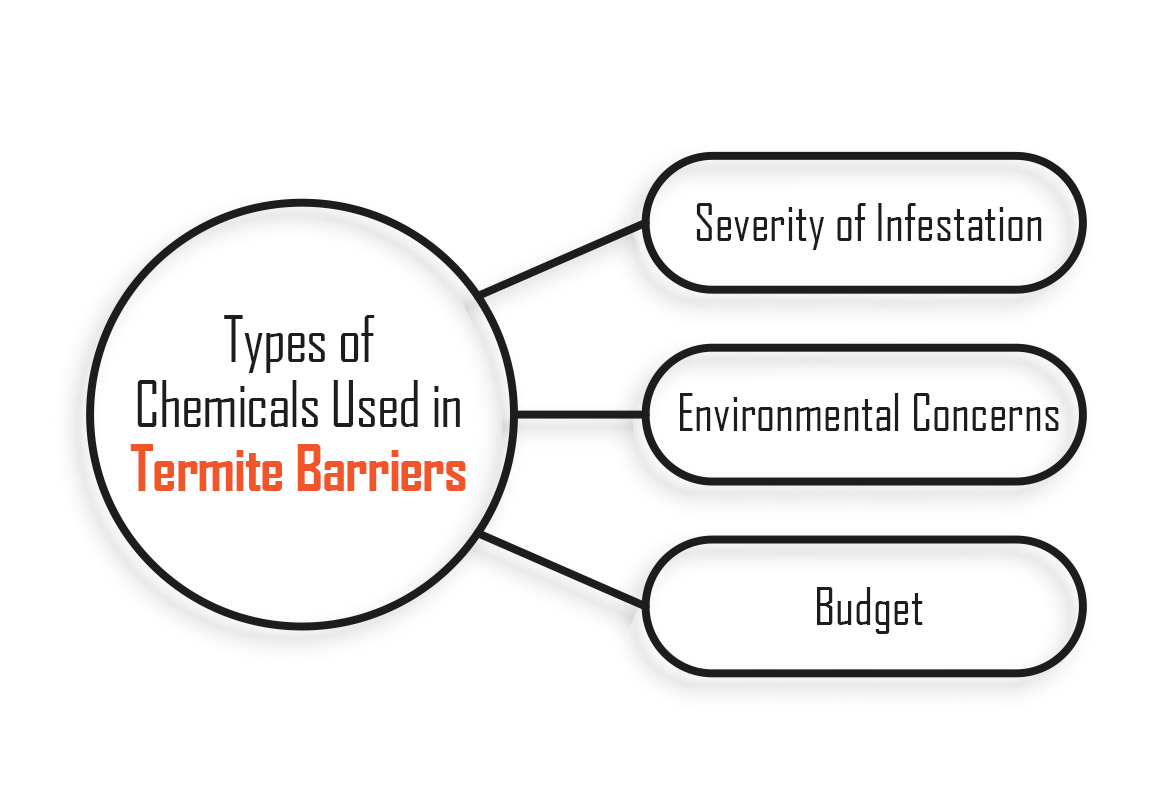
Types of Chemicals Used in Termite Barriers
The effectiveness of a termite chemical barrier depends on choosing the right chemicals. Different chemicals have unique properties, benefits, and costs. Here are some commonly used chemicals in termite barriers:
Termidor:
- Effectiveness: Termidor is known for being very effective and providing long-lasting protection. It kills termites quickly and keeps working for a long time.
- How It Works: When termites come into contact with Termidor, they don’t die immediately. Instead, they spread the chemical to other termites through contact, which helps eliminate the entire colony.
- Cost: Termidor can be more expensive than other options, but its effectiveness and longevity make it worth the investment.
- Usage: It’s often used by professionals due to its powerful and lasting results.
Premise:
- Effectiveness: Premise is also very effective and works well against a broad range of termite species. It creates a zone that termites can’t detect, so they continue to move through it and get poisoned.
- Environmental Impact: Premise is considered environmentally friendly, making it a good choice for homeowners concerned about the environment.
- Cost: It’s generally more affordable than Termidor, providing a good balance between cost and effectiveness.
- Usage: Suitable for both professional use and DIY projects due to its safety and effectiveness.
- Bifenthrin:
- Effectiveness: Bifenthrin is effective and provides good residual protection, meaning it keeps working for a while after application.
- Cost: This is a more affordable option, making it a goodchoice for budget-conscious homeowners.
Choosing the right chemical depends on several factors:
- Severity of Infestation: If you have a severe termite problem, you might need a stronger chemical like Termidor.
- Environmental Concerns: If you’re worried about the impact on the environment, Premise could be the best choice.
- Budget: If you’re looking to save money, bifenthrin is a more budget-friendly option.
Factors Affecting Termite Chemical Barrier Cost
The cost of installing a termite chemical barrier depends on several factors that can affect the overall price. Here are the key ones:
- Size of the Property and Extent of Infestation:
Larger properties or severe infestations need more chemicals and labor, which increases the termite chemical barrier cost. - Type of Chemical Used and Application Method:
Choosing high-quality chemicals and advanced application methods might cost more upfront, but they offer better protection and last longer. This also affects the termite chemical barrier cost.
By carefully considering these factors, homeowners can understand what affects the termite chemical barrier cost and make smart choices that fit their budget and termite protection needs. Ultimately, understanding these elements can help you manage and anticipate the termite chemical barrier cost effectively.
Read More:
How much does termite treatment cost?
how much does a termite barrier cost?
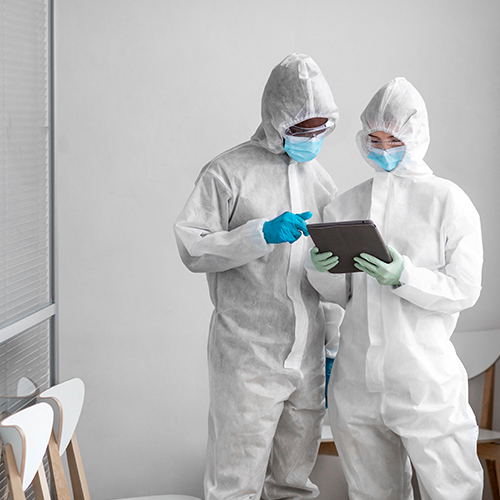
Professional Installation of Termite Chemical Barriers
While some homeowners might consider a DIY termite barrier installation, hiring professional pest control services is usually the best choice for optimal protection and effectiveness. Professional installation offers many benefits:
- Expertise and Experience:
Pest control experts have the knowledge and skills to install termite barriers correctly, reducing the chance of mistakes. This ensures that the termite chemical barrier cost is well spent. - Tailored Solutions:
Professionals provide customized solutions based on the specific needs of your property, offering the best long-term protection. This helps in managing the overall termite treatment barrier cost effectively. - Comprehensive Coverage:
Professional services include thorough inspections, precise application of chemicals, and follow-up checks to ensure your home is fully protected from termites. This makes the termite barrier costs worth the investment.
Hiring professionals for your termite chemical barrier ensures you get the best results, giving you peace of mind and long-lasting protection. By considering the termite treatment barrier cost and termite barrier costs, you can make an informed decision that maximizes the value of your investment.
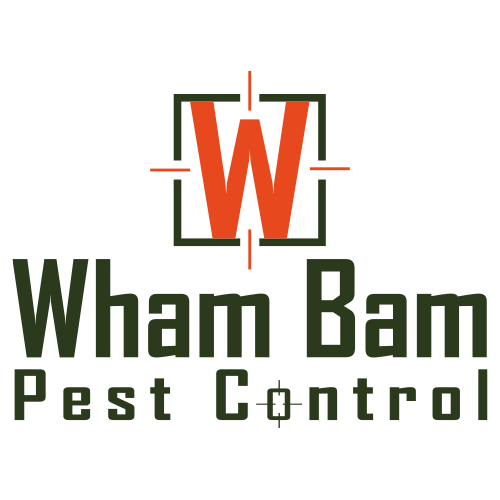
Importance of Hiring Professional Pest Control Services
Professional pest control services, like those provided by Wham Bam Pest, offer many advantages over DIY options:
- Cost-Effectiveness: Even though the initial termite chemical barrier cost might seem high, professionals at Wham Bam Pest include everything—labor, materials, and ongoing support. This offers long-term value and peace of mind.
- Efficiency and Reliability: Pest control experts from Wham Bam Pest use advanced techniques and equipment to ensure precise application and maximum effectiveness. This reduces the risk of termite infiltration and damage, making the termite treatment barrier cost worthwhile.
- Risk Mitigation: Hiring professionals for termite barrier installation from Wham Bam Pest reduces the risk of mistakes. This safeguards your investment and maintains your property’s value, justifying the termite chemical barrier cost.
Cost Considerations When Hiring Professionals
Installation of a professional termite barrier cost varies based on factors like property size, the severity of the infestation, and the chosen service provider. On average, homeowners can expect to pay between $1,000 to $3,000 or more for professional installation. This includes labor, materials, and ongoing support.
Factors Affecting Costs: Property Size: Larger properties generally require more materials and labor, leading to higher costs for installation.
Infestation Severity: The severity of the termite infestation can impact the extent of treatment needed, influencing the overall cost.
Selected Service Provider: Different pest control companies may offer varying prices for their services. It’s essential to compare quotes and services offered. Wham Bam Pest provides competitive pricing and comprehensive service packages to ensure you receive the best value for your investment.
While the initial investment for professional termite barrier installation may seem significant, it’s crucial to consider the long-term benefits and cost-effectiveness. Investing in professional installation by WHAM BAM Pest Control provides thorough termite protection, which can save homeowners from the potential expenses associated with termite damage and repair efforts in the future.
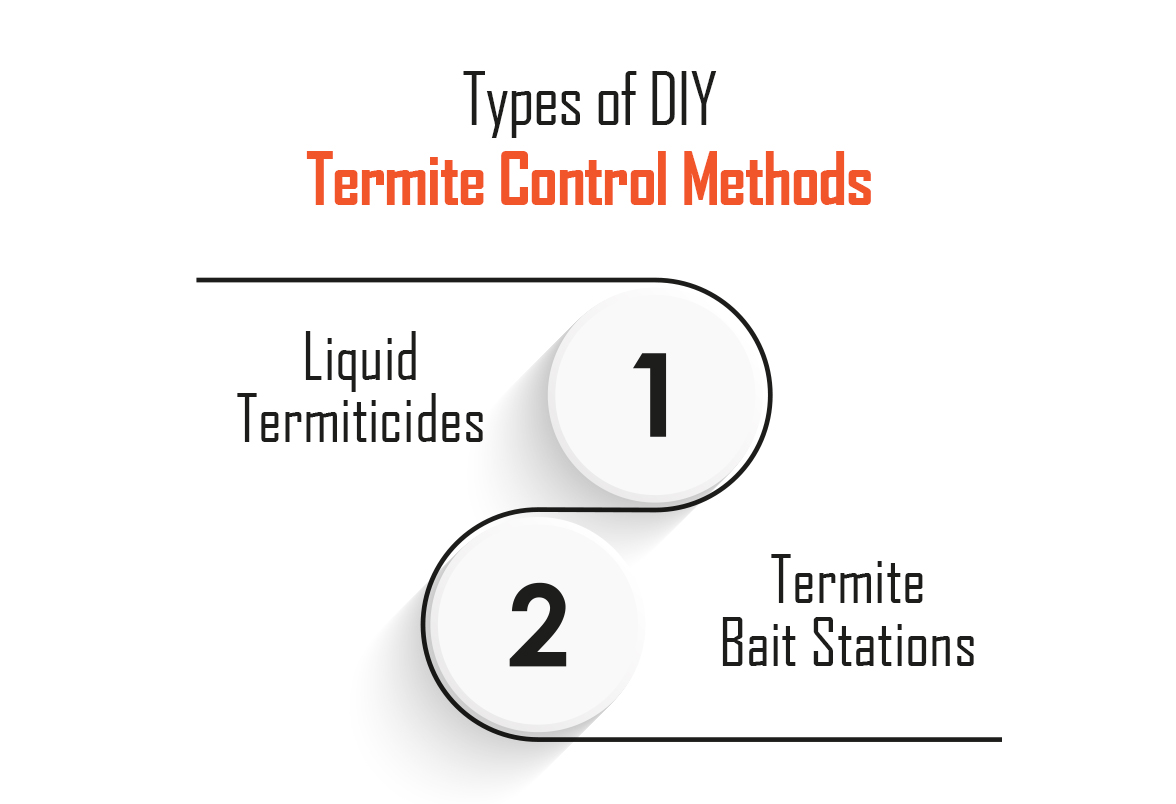
DIY Termite Chemical Barrier Options
For homeowners who prefer to take matters into their own hands, DIY termite chemical barrier options provide a practical alternative to professional installation. While these DIY projects demand more effort and accountability from the homeowner, they come with the potential for cost savings and a feeling of empowerment in managing termite issues.
Types of DIY Termite Control Methods:
- Liquid Termiticides:
- Liquid termiticides are commonly used in DIY termite control. These chemical solutions are applied around the perimeter of the home or directly to termite-infested areas to create a protective barrier.
- Termite Bait Stations:
- Termite bait stations are another effective DIY option. These systems consist of bait stations strategically placed around the property to attract termites. Once the termites consume the bait, they carry it back to their colony, effectively eliminating the termite population.
N.B. Termite bait stations themselves do not typically contain chemical solutions. However, they do utilize bait that often contains chemical agents designed to eliminate termites.
DIY Termite Barrier Products Available in the Market
An array of DIY termite barrier products are readily accessible to homeowners, including:
- Liquid Termiticides: Apologies for the oversight. Let me correct that:
Liquid termiticides containing active ingredients such as Fipronil and Imidicloprid stand out as top-notch termite eradication solutions, forming an imperceptible shield around your residence, effectively eliminating termites from your surroundings. These active ingredients, being non-repellent, remain undetectable to termites, ensuring they unwittingly ingest and disseminate them throughout the termite colony. Opting for these treatment methods provides you with cost-effective alternatives akin to the generic versions of Termidor SC. The existing chemical barrier pesticides presently available are engineered to endure approximately 5-10 years such as Termidor SC, designed for easy application around the property’s perimeter, offering effective termite protection at a fraction of the termite chemical barrier cost of professional services.
- Termite Baits: Employed to attract and eliminate termites before they reach the structure, termite baits offer a proactive approach to termite management, albeit requiring ongoing monitoring and maintenance. Utilizing termite baiting systems offers an alternative to soil injections for termite control, effectively managing termite chemical barrier cost. The Trelona ATBS Termite Bait System recommended due to continuous technological advancements, effectively eliminates termites and serves as a monitoring tool. Advanced termite Bait Stations, employed for termite detection and eradication, are integral components of an effective termite chemical barrier strategy.
Read More: Termite Treatment Cost Sydney and you van know more detiels from our blog.
Steps for Applying Termite Chemicals on Your Own
Steps for DIY Termite Control:
- Inspect Your Property:
- Begin by inspecting your property for signs of termite activity, such as mud tubes, damaged wood, or discarded termite wings. Identifying problem areas will help determine the best course of action for termite control.
- Choose the Right Method:
- Select the DIY termite control method that best suits your needs and the extent of the infestation. Consider factors such as effectiveness, ease of application, and environmental impact when making your decision.
- Application:
- Follow the manufacturer’s instructions carefully when applying DIY termite control products. Use the appropriate equipment and protective gear to ensure safe and effective application.
- Monitor and Maintain:
- Regularly monitor the treated areas for any signs of termite activity. Reapply DIY termite control products as needed to maintain the effectiveness of the treatment and prevent future infestations.
Considerations for DIY Termite Control:
- Product Selection:
- Choose DIY termite control products that are specifically designed for residential use and approved for DIY applications. Research different products to find the one that best meets your needs and budget.
- Safety Precautions:
- Always wear appropriate protective gear, such as gloves and a mask, when handling DIY termite control products. Follow all safety guidelines provided by the manufacturer to minimize the risk of exposure.
- Environmental Impact:
- Consider the environmental impact of the DIY termite control products you choose. Opt for products that are labeled as safe for the environment and non-toxic to humans and pets.
Evaluating the Overall Cost of Termite Chemical Barriers
Comparing the Termite Chemical Barrier Cost: Professional Installation vs. DIY Options
When considering the termite chemical barrier cost of professional installation versus DIY alternatives, it’s crucial to assess not only the financial aspect but also factors like effectiveness and convenience.
Professional installation may seem costly upfront, ranging from $1,000 to $3,000 or more. However, it offers significant benefits:
- Expertise and Assurance: Pest control professionals bring expertise and assurance, backed by experience and a proven track record in Termite Management System Cost.
- Comprehensive Coverage: Professional installation includes thorough inspections, precise chemical application, and ongoing support, ensuring complete protection against termite threats.
- Long-Term Value: Despite the initial investment, professional services provide long-term value by mitigating the risk of termite damage and associated expenses.
On the other hand, DIY options offer a more budget-friendly approach, typically costing between $200 to $800. But they come with challenges:
- Skill and Knowledge Requirement: DIY termite barriers demand a certain level of skill and knowledge for effective application and long-term efficacy.
- Time and Effort: DIY projects require significant time and effort, from research and preparation to application and maintenance.
- Risk of Errors: Inexperienced DIYers may make mistakes during the application, compromising the barrier’s effectiveness and leaving the property vulnerable to termite infestations.
Long-Term Cost Benefits of Termite Barriers
While the initial termite chemical barrier cost may seem daunting, the long-term benefits outweigh the expenses:
- Preventive Maintenance: Termite barriers serve as proactive preventive maintenance, preventing termite infestations and associated damage.
- Preservation of Property Value: Protecting the property from termites preserves its structural integrity and resale value.
- Avoidance of Costly Repairs: Termite damage repairs are costly, making termite barriers a cost-effective investment in avoiding future expenses.
- Peace of Mind: Most importantly, termite barriers provide peace of mind, knowing the property is fortified against termite threats and financial liabilities.
In conclusion, the termite chemical barrier cost encompasses various factors and trade-offs. From chemical selection to installation methods and the choice between professional services and DIY options, homeowners must make informed decisions to ensure effective and cost-efficient termite protection measures for their property.
